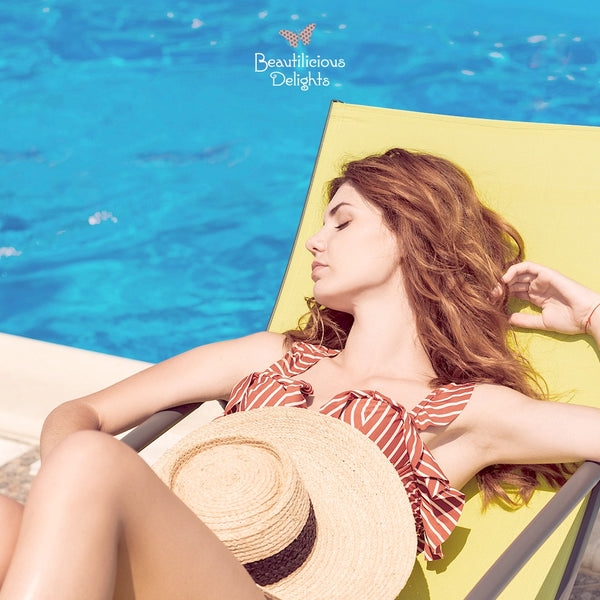What I have noticed from the various messages I receive is that there is still little awareness of what happens and how much hair is damaged when we expose it to the sun, salt and/or chlorine.
Since they don't burn like skin does and therefore don't hurt us like sunburn, we are led to think that hair doesn't suffer when we sunbathe.
But then when autumn arrives, we regularly complain of having damaged hair , with broken or split ends , parched, rougher and more fragile lengths , so much so that it looks like straw not to mention the faded color.
And to think that it would be enough to dedicate a few more minutes to our hair during the beauty routine and protect it even on the beach exactly as we do (I hope so!) even with our. skin.
Does the sun hurt?
We must not demonize the sun, on the contrary! It's just good for us. The vitamin D that diffuses increases the production of keratin (main protein in our stem). Read more here: How and from what is hair made?!
But if we expose our hair to the sun in the central hours of the day and moreover without protecting it, rest assured that its action will go from being beneficial to being harmful.
If to convince you to take care of your hair when you go to the beach or the pool you need to gain more awareness of what happens to your hair when you expose it to the sun , I bet you'll think twice afterwards before exposing it lightly and without protecting it.
What happens when we expose our hair to strong sunlight, humidity and UV rays, to which we also add sea salt or pool water chlorine?
Let's start from the premise that the physical characteristics of hair exposed to the sun, salt, high humidity undergo changes that you can ascertain firsthand by observing your hair : it is much more fragile and prone to breakage, less elastic and less resistant to mechanical damage from the brush and hair dryer.
The damage of the sun's rays, high humidity, saltiness, chlorine, on unsuitably protected hair occurs at 2 levels:
- at stem level
- at the level of the scalp.
Stem damage:
-
Thinning of the hair shaft
-
Dehydration and dryness of the stem
-
Color fading
The excess of free radicals produced by the sun leads to a degradation of the pigments which results in the fading of the colour, whether natural or artificial. THE hair, day after day, seems lighter, as lightened. It's not just an impression, it's the chlorine (sodium chloride) , contained in sea salt, which promotes oxidation . We are therefore witnessing a real natural discoloration, which unfortunately makes the hair brittle and dry .
-
Fragile, rough, brittle and lifeless lengths
due to humidity, wind and sunlight.

Scalp damage:
The hot sun, the high humidity, the saltiness
- they overheat and “inflame” the scalp
- they upset and weaken the balance of the scalp
- they alter the microcirculation making it difficult for the supply of oxygen and nourishment to the roots.
And if you have light hair, you can easily find yourself with a burnt scalp.
But are there only negative consequences following exposure to the sun and sea water?
Fortunately no!
Sea water also benefits the skin and can perform a natural micro-stimulation on the scalp, purifying the bulbs and stem.
Especially oily hair will benefit a lot from it. Not to mention the benefits that the sun and sea water combo gives to skin suffering from seborrheic dermatitis.
Obviously, you have to be careful about how long your hair stays in contact with sea water which, containing salt, tends to dry out hair that is already dry or frizzy .
I saw your eyebrows raised in amazement! You may be wondering why you even bother rinsing seawater out of your hair.
I'm sure that by discovering the motivation behind this advice, you will not indulge further:
The sea salt crystals that remain on the stem look like tiny hot lenses that attract the sun's rays, leading to dehydration of your hair .
Which type of hair is less affected by UV rays, salt or chlorine?
Obviously if you have fine and thin hair , they are less resistant and will suffer the damage much more than thick hair with a sturdy stem.
Medium-dark hair is a little more protected thanks to the natural melanin found inside the shaft. The darker the hair, the higher the concentration of melanin contained in the cortex and the less damage there will be.
If you are now wondering what you should do to protect your hair from all these damages, you can discover my tips in the dedicated article: My Hair care routine by the sea
© Beautiful Delights
In the online shop you will find everything you need (including herbal dyes) to take care of your skin and hair in a conscious way. Click HERE to visit it!
************************************************** ************************************
Keep in touch with us:
Follow us on SOCIAL by clicking on the icons below to stay up to date on the latest news:
Rozalia & the Beautilicious Delights Team.



